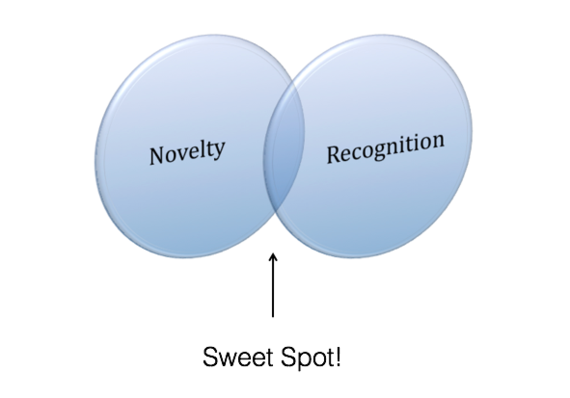
Many of us are finding that we can’t go long with out checking. And it’s not just about social media – it’s about our smartphones too. Rewind to just over a decade ago before the first iPhone arrived on the scene. You actually had to be at home or work to check your Facebook (or MySpace, remember that?). Before smartphones, social media was something that was done on computers where breaks from it were naturally enforced. Not so today.
Back then when Blackberry smartphones were still a thing they were jokingly referred to as “Crackberry”. Looking back, it’s astonishing to think that something so basic (and so ugly) could so addictively catch our attention. Today’s smartphones make the Blackberry about as exciting as a calculator. Today’s brightly-lit smartphone’s addictive appeal goes right to the basic operating systems of our brains.
The Venn Diagram of Attention and Novelty
The combination of the portability of a smartphone and the draw of social media creates a heady mix that is irresistible. It’s like nachos and cheese, waffles and syrup, salted and caramel. Imagine two sets of a Venn diagram. In one set you have “novelty” and the other you have “validation”. Where those two overlap you have the sweet spot that makes social on your mobile so irresistible to your brain.

Now think, what’s a notification? Something new and unexpected on your phone (n0vel) that’s all about you (validation). That gets your attention – and it fires up the dopamine reward centres of your brain like a pinball machine.
(Have you checked your phone yet? That’s why you check)
Though we are wired to check because those notifications indicate that somebody is thinking of us, all that checking doesn’t actually make us feel good. Further, while feel compelled to check emails, most of them bring us the opposite of bliss. We keep close to the conversation on each other’s walls, despite the fact that we’re continually red in the face at our friends’ political views or posts in bad taste.
Your brain’s desire for validation and novelty gets hijacked by social media, texts and emails, even though we often feel worse for having looked at them. Paradox.
It’s not social if it gets in the way of your relationship with yourself and others
If you haven’t made it this far without checking, your habit may be seriously threatening the quiet reflection you need to have a degree of mental rest in your life. Being in a constant state of distraction can seriously detract from a general sense of wellbeing.
While the “social” aspect of networking does indeed keep us connected to others, it does this best with secondary and tertiary relationships (friends and acquaintances). But if it starts to replace complex “real life” face-to-face moments with loved ones, you are replacing attention from a living breathing person in front of you for a notification on your phone. Validation isn’t the same thing as love, and we need love more.
The thing about face-to-face relating is that it’s complex and requires a lot of attention from you and the other. This complexity is like a nutritious meal for your psyche – full of vegetables and good stuff that keep you satisfied for hours. You might not like every bite, but you know it does the body good. Social media is more like a tasty cheeseburger. Sometimes it’s the only thing that hits the spot, but you wouldn’t want to rely on them for every meal.
Same old psychology deployed through new technologies
While researching my book The Psychodynamics of Social Networking I found that the reason why social media is so successful is that it operates on some of the most basic components of our psychologies. We are essentially social animals and the need to relate is paramount. Further, the way we “show up” to others is essential to our survival, so we can get pretty hung up on how we feel we appear in others’ minds.
Social media like Facebook, Twitter, and Instagram capitalise on these basic desires and hook us into over-concern with our own appearances and those of others. Further, they reduce the complexity of social interaction in a way that can later make face-to-face communication scary and awkward. Sure, it’s easy to meet someone on Tinder and charm them with your witty texts – but it’s what happens next that counts – moving it online to offline. Often, when offline gets too hard, we go back online again for comfort – only it’s frequently the comfort of that cheeseburger, which might be starting to make us sick.
Reclaim your life by making active choices
Don’t get me wrong, tech can be great, the trouble is that most people are passive in how they use it. If their phone rings, they answer it; if the notification flashes, they check it; if emails ping, read them. In this approach tech controls us, rather than the other way around.
If you’ve been unable to get through a five-minute article without checking, who’s in charge? If you’re more interested in your likes and re-tweets than your loved one across the table, then what’s more important? Isn’t it time we all got more intentional about our tech use?
Acknowledging the challenges of distraction today, Stillpoint Spaces London recently opened its “Lab,” an “open-source psychology” co-working hub in Clerkenwell offering a place for those interested in thinking psychologically about their work and their lives. Co-working space by day and event-space by night, we offer the conditions for psychological engagement with modern life.
After all, you don’t need a full digital detox when you can have a simple strategy. Think about how your social media engagement makes you feel, and start making informed choices about how you engage with it. By doing it on your terms you’ll find that your personal and interpersonal worlds become much calmer, richer, and more nutritious.
Dr. Aaron Balick is a psychotherapist, cultural theorist, author and the Director of Stillpoint Spaces London, a new psychological hub, co-working, and events space where we explore psychology, in depth, inside and outside the consulting room.
— This feed and its contents are the property of The Huffington Post UK, and use is subject to our terms. It may be used for personal consumption, but may not be distributed on a website.